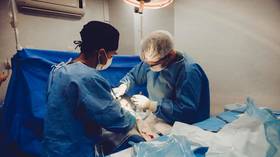Surgeons perform drastically worse on their birthdays, creating 23% surge in elderly patients’ death rates

Startling new research has found that elderly patients’ 30-day mortality rate leaps significantly if they go under the knife on the same day as the operating surgeon’s birthday, compared with any other day of the year.
The study was published in the British Medical Journal (BMJ) and found that the “birthday effect” increased the 30-day mortality rate for elderly patients by 23 percent, to a total of 6.9 percent, compared with the average 5.6-percent rate for every other day of the year.
The researchers examined some 980,876 procedures in US hospitals, performed by 47,489 surgeons. A total of 2,064 (0.2 percent) of the procedures took place on the surgeon’s birthday. All patients in the study were aged 65 to 99 and underwent one of 17 common emergency surgeries between the years 2011 and 2014.
Also on rt.com SECOND health worker in Alaska suffers allergic reaction after getting Pfizer Covid-19 jabThe list of procedures included cardiovascular surgeries, appendectomies, bowel resections and hip surgeries, among others, but the study focused on emergency surgery.
The authors highlight that the so-called “birthday effect” extends to other celebrations and festivities.
“The effect size of surgeons’ birthday observed in our analysis (1.3 percentage point increase or a 23% increase in mortality), though substantial, is comparable to the impact of other events, including holidays (e.g., Christmas and New Year) and weekends,” the authors write.
In order to add additional layers of control to the research, the researchers excluded surgeons with the highest patient mortality rates, assigned some surgeons a “pseudo birthday” and double-checked that surgeons didn't take on an excessive number of operations on their birthdays.
They also controlled for milestone birthdays (such as turning 40 or 50) while also adjusting for birthdays which fell on a Friday.
Without all of these adjustments, the patients’ 30-day mortality was even higher, at roughly seven percent as opposed to 5.6 percent.
Also on rt.com Trauma surgeons decry UNDERREPORTING of US gun violence & cherry-picking media coverage in damning new reportThe authors suggest distractions in the form of birthday wishes received on the surgeons’ phones, rushing to get through procedures to make celebrations, more well-wishes from colleagues in person and other factors might explain the so-called “birthday effect.”
Indeed, the researchers also found that many surgeons opted not to work on their birthdays. While this doesn't necessarily impact the study, it does add credence to the idea that the day is significant enough in the minds of surgeons to potentially constitute a distraction.
A 2014 study of Scottish emergency rooms showed patients had a 27 percent higher 30-day mortality rate on public holidays.
Think your friends would be interested? Share this story!













